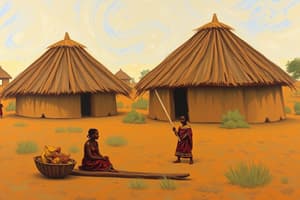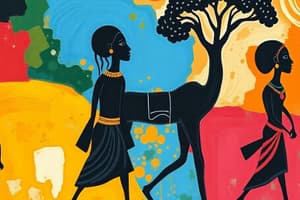Podcast
Questions and Answers
Marabouts in ancient Mali were primarily responsible for storytelling and preserving cultural history.
Marabouts in ancient Mali were primarily responsible for storytelling and preserving cultural history.
False (B)
Griots in ancient Mali were tasked with teaching the Quran and religious texts to the population.
Griots in ancient Mali were tasked with teaching the Quran and religious texts to the population.
False (B)
Warriors in ancient Mali were trained in the use of weapons like shields, clubs, and javelins.
Warriors in ancient Mali were trained in the use of weapons like shields, clubs, and javelins.
False (B)
Farmers were considered less important than traders in ancient Malian society.
Farmers were considered less important than traders in ancient Malian society.
Artisans in ancient Mali were responsible for creating weapons and armor used by the warriors.
Artisans in ancient Mali were responsible for creating weapons and armor used by the warriors.
Farmers in ancient Mali were primarily responsible for raising livestock like camels and horses.
Farmers in ancient Mali were primarily responsible for raising livestock like camels and horses.
Traders in ancient Mali exchanged goods like gold, salt, and ivory for textiles, spices, and slaves.
Traders in ancient Mali exchanged goods like gold, salt, and ivory for textiles, spices, and slaves.
Timbuktu in ancient Mali was mainly a center for agriculture and farming.
Timbuktu in ancient Mali was mainly a center for agriculture and farming.
Artisans in ancient Mali included professions like blacksmiths, weavers, and metalworkers.
Artisans in ancient Mali included professions like blacksmiths, weavers, and metalworkers.
Religious practices had no influence on the job specialization in ancient Mali.
Religious practices had no influence on the job specialization in ancient Mali.
Flashcards are hidden until you start studying
Study Notes
Society in Ancient Mali
- Ancient Malian society consisted of various specializations, including farmers, traders, artisans, religious figures, and warriors.
- Farmers made up the majority of the population and grew crops like millet, sorghum, and rice, as well as raised livestock like cattle, sheep, and goats.
Agriculture and Economy
- The success of the empire's economy depended on the ability of farmers to produce enough food to sustain the population.
Trade and Commerce
- Ancient Mali was strategically located at the crossroads of several important trade routes, making trade a crucial part of the economy.
- Traders transported goods like gold, salt, and ivory across the Sahara Desert and exchanged them for other goods like textiles, spices, and slaves.
- Timbuktu was a major trade city in ancient Mali, specializing in the trade of gold and other luxury goods.
Artisans and Crafts
- Artisans, including blacksmiths, weavers, and leatherworkers, created a range of products like weapons, tools, clothing, and jewelry.
- Artisans were highly respected in Malian society and often worked for the royal court or wealthy merchants.
Religion and Culture
- Islamic scholars taught the Quran and other religious texts.
- Griots, or storytellers and oral historians, preserved the empire's history and culture through song and poetry.
- Marabouts were Islamic holy men and spiritual leaders.
- Warriors, trained in the use of weapons like spears, swords, and bows, protected the empire's borders and enforced laws, often accompanied by cavalry riding horses or camels.
Studying That Suits You
Use AI to generate personalized quizzes and flashcards to suit your learning preferences.




